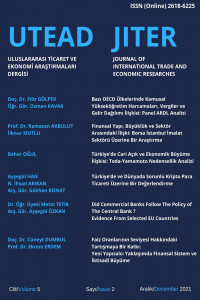DIŞ TİCARETİN DİJİTAL DÖNÜŞÜMÜ: YAPAY ZEKA TEKNOLOJİSİ
Dış ticaret, ülkeler arasındaki mal ve hizmetlerin ticareti olarak tanımlanır ve küreselleşmenin önemli bir bileşenidir. Dış ticarette, verimlilik, kalite, maliyet ve lojistik gibi faktörlerin doğru yönetimi için yapay zeka teknolojisi birçok fayda sağlayabilir. Yapay zeka, süreçleri kolaylaştırarak, verimliliği artırarak ve karar vermeyi geliştirerek dış ticarette devrim yaratma potansiyeline sahip, hızla büyüyen bir alan olarak karşımıza çıkmaktadır. Son yıllarda yapay zeka teknolojilerinin gelişimi, dış ticaretteki rolünün artması ile birlikte, bu alanın önemli bir parçası haline gelmiştir. Bu makale, yapay zeka teknolojisinin dış ticarette kullanılmasının avantajlarını ve dezavantajlarını keşfetmek için genel bir değerlendirme sunmaktadır.
Anahtar Kelimeler:
Dış Ticaret, Teknoloji, Yapay Zeka
Digital Transformation of Foreign Trade: Artificial Intelligence Technology
Foreign trade is defined as the trade of goods and services between countries and is an important component of globalization. In foreign trade, artificial intelligence technology can provide many benefits for the correct management of factors such as efficiency, quality, cost and logistics. Artificial intelligence emerges as a rapidly growing field with the potential to revolutionize foreign trade by facilitating processes, increasing efficiency and improving decision making. In recent years, the development of artificial intelligence technologies has become an important part of this field with its increasing role in foreign trade. This article provides an overview to explore the advantages and disadvantages of using artificial intelligence technology in foreign trade.
Keywords:
Foreign Trade, Technology, Artificial Intelligence,
___
- Adalı, E. (2012). Doğal dil işleme. Türkiye Bilişim Vakfı Bilgisayar Bilimleri ve Mühendisliği Dergisi, 5(2).
- Aydemir, E., & Demirli, C. (2020). Eğitim Kurumlarında Yönetim Bilişim Sistemleri ve Yapay Zekâ Kullanımı. M.K. Yılmaz ve N. Ö. İyigün (Ed.), Oyun Değiştiren Yapay Güç Yapay Zekâ içinde (s.417-430). İstanbul: Beta Kitap.
- Achar, S. (2019). Early Consequences Regarding the Impact of Artificial Intelligence on International Trade. American Journal of Trade and Policy, 6(3), 119-126.
- Boyd, R., & Holton, R. J. (2018). Technology, innovation, employment and power: Does robotics and artificial intelligence really mean social transformation?. Journal of Sociology, 54(3), 331-345.
- Brynjolfsson, E., Rock, D., & Syverson, C. (2018). Artificial intelligence and the modern productivity paradox: A clash of expectations and statistics. In The economics of artificial intelligence: An agenda (pp. 23-57). University of Chicago Press.
- Çakıroğlu, M. A., & Süzen, A. A. (2020). Assessment and application of deep learning algorithms in civil engineering. El-Cezeri, 7(2), 906-922. Davies, E. R. (2004). Machine vision: theory, algorithms, practicalities. Elsevier.
- Demirkan, H., Earley, S., & Harmon, R. R. (2017). Cognitive computing. IT professional, 19(4), 16-20.
- Duran, C., & Şenyılmaz, A. (2020). Satın Almada Yapay Zekâ Uygulamaları. M.K. Yılmaz ve N. Ö. İyigün (Ed.), Oyun Değiştiren Yapay Güç Yapay Zekâ içinde (s.163- 188). İstanbul: Beta Kitap.
- Goldfarb, A., & Trefler, D. (2019). How Artificial Intelligence Impacts International Trade. The World Trade Report 2018: The Future of World Trade: How Digital Technologies are Transforming Global Commerce, 140.
- González, A. G. (2006). The software patent debate. Journal of Intellectual Property Law & Practice, 1(3), 196- 206.
- Makridakis, S. (2017). The forthcoming Artificial Intelligence (AI) revolution: Its impact on society and firms. Futures, 90, 46-60.
- Meltzer, J. P. (2018). The impact of artificial intelligence on international trade. Brookings Institution, Thursday, December, 13, 2016.
- McCarthy, J., Minsky, M. L., Rochester, N., & Shannon, C. E. (2006). A proposal for the dartmouth summer research project on artificial intelligence, august 31, 1955. AI magazine, 27(4), 12-12.
- McCulloch, W. S., & Pitts, W. (1943). A logical calculus of the ideas immanent in nervous activity. The bulletin of mathematical biophysics, 5, 115-133.
- Öymen, G. (2021). Yapay Zekâ Aracılığıyla Marka Kimliği İnşası: Sanal Asistanlar Örneği. M.K. Yılmaz ve N. Ö. İyigün (Ed.), Oyun Değiştiren Yapay Güç Yapay Zekâ içinde (s.95-116). İstanbul: Beta Kitap.
- Ratner, B. (2000). A comparison of two popular machine learning methods. Mine Tech.
- Sağlamtunç, K. S. (17 Aralık, 2020). Artıfıcıal ıntellıgence/Yapay zeka. Makine Mühendisleri Odası. Erişim Adresi: https://www.mmo.org.tr/sites/default/files/users/zeyne p/AI%20-%20ARTIFICIAL%20INTELLIGENCE%20- %20YAPAY%20ZEKA.pdf Erişim Tarihi: 10.01.2023.
- Savinov, Y. A., & Taranovskaja, E. V. (2020). Artificial Intelligence in international trade. Russian Foreign Economic Journal, (4), 58-71.
- Shabbir, J., & Anwer, T. (2018). Artificial intelligence and its role in near future. arXiv preprint arXiv:1804.01396.
- Tsolakis, N., Zissis, D., Papaefthimiou, S., & Korfiatis, N. (2022). Towards AI driven environmental sustainability: an application of automated logistics in container port terminals. International Journal of Production Research, 60(14), 4508-4528.
- ISSN: 2564-7318
- Başlangıç: 2017
- Yayıncı: Mehmet ŞENTÜRK
